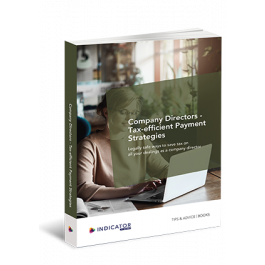Company Directors - Tax-efficient Payment Strategies
Legally safe ways to save tax on all your dealings as a company director
A Tips & Advice book about...
In a nutshell
This book shows how to increase your net income and stay off HMRC’s radar through proper tax planning. It features legally safe ways to save tax on all your dealings as a director. Instead of focusing on schemes, it explains in simple to follow steps how to claim all your entitlements. This new edition has been fully updated with the latest tax rates and deductions.
In detail
In recent years the government has taken an increasingly aggressive approach to tax-saving schemes and arrangements. To ensure HMRC doesn’t run off with the lion’s share of your hard-earned income, our team of experts have put together this book. It covers:
- Tips to make the best use of remuneration strategies such as
- Salaries, dividends and benefits
- Pensions
- Company loans
- And much more...
- Vital strategies to minimise
- Income tax
- National Insurance
- Capital gains tax
- Inheritance tax
In this book you’ll find all the key facts and see how to use them through worked examples. It will help you exploit the loopholes and reduce the amount of tax payable.
We've created this Tips & Advice book especially for...
Company directors that want to:
- Minimise tax and NI in a legitimate way
- Increase their net income
- Make the best use of remuneration strategies
Tax advisors that want to:
- Help their clients take income from their company in the most tax-efficient ways
In this Tips & Advice book you'll read about...
1. Salaries
1.1. A director’s perspective
1.2. Minimum salary, the NMW and the NLW
1.3. Salary waiver
1.4. Spouse’s/family members’ salary
1.5. Year-end bonus
1.6. National Insurance employment allowance
1.7. Key points
2. Benefits and expenses
2.1. A director’s perspective
2.2. Tax relief for the company
2.3. School fees
2.4. Moving home
2.5. Cheap-rate or interest-free loans
2.6. More than one company car
2.7. Is a van cheaper?
2.8. Computers and other IT equipment
2.9. Childcare vouchers
2.10. Travel and subsistence costs
2.11. Trivial and minor benefits
2.12. Key points
3. Dividends and distributions
3.1. A director’s and shareholder’s perspective
3.2. Timing payments of dividends
3.3. Dividend waivers
3.4. Separate classes of shares
3.5. Dividend income for a spouse or partner
3.6. Dividend income for children
3.7. Key points
4. Pension scheme strategies
4.1. The director’s perspective
4.2. The tax-advantaged pension scheme
4.3. Corporation tax relief for your company
4.4. Salary sacrifice option
4.5. Contribution without earnings
4.6. Ownership of the company’s assets
4.7. Pension fund borrowings summary
4.8. Contribution for a spouse
4.9. Key points
5. Financing the company
5.1. The director’s perspective
5.2. Claiming tax relief on interest on loans to buy shares in or lend money to your company
5.3. Company borrows to acquire assets for your use
5.4. Interest on shareholder loans to the company
5.5. Seed enterprise investment scheme
5.6. Key points
6. Capital allowances
6.1. A director’s perspective
6.2. Timing
6.3. Assets qualifying for a 100% tax allowance
6.4. Key points
7. Buying another company
7.1. The director’s perspective
7.2. Assets or shares?
7.3. Allocation of purchase consideration
7.4. Hive-downs
7.5. Tax due diligence
7.6. Tax indemnities
7.7. Losses
7.8. Borrowing costs
7.9. Stamp duty
7.10. VAT
7.11. Buy-to-sell shares
7.12. Termination payments
7.13. Deferred consideration
7.14. Key points
8. Reorganising share ownership
8.1. The director’s perspective
8.2. Gifts of shares to spouse
8.3. Gifts of shares to family members, employees, etc.
8.4. Gift holdover relief
8.5. Employment tax charges
8.6. Purchase own shares
8.7. Key points
9. Succession planning
9.1. The director’s perspective
9.2. Preserving business property relief
9.3. Passing shares to the next generation
9.4. Pre-owned assets tax (POAT)
9.5. Business premises personally owned
9.6. Key points
10. Selling your company
10.1. The director’s perspective
10.2. Timing
10.3. Sale of assets and trade
10.4. Sale of shares
10.5. IHT
10.6. Warranties and indemnities
10.7. Anti-avoidance
10.8. Key points
11. Winding up your company
11.1. The director’s perspective
11.2. Capital distribution
11.3. Availability business asset disposal relief
11.4. Last minute dividend?
11.5. Phoenix companies
11.6. Key points
12. Going offshore
12.1. The director’s perspective
12.2. Your own offshore accounts/assets
12.3. Your company’s offshore interests
12.4. Costs and compliance
12.5. Offshore jurisdictions
12.6. When selling your UK company
12.7. Key points
13. Trusts
13.1. The director’s perspective
13.2. The trusts tax regime
13.3. Use of trusts
13.4. Tax implications of creating a trust
13.5. Types of trust
13.6. Key points
14. Income tax planning
14.1. Introduction
14.2. What’s tax free?
14.3. Getting your allowances
14.4. Avoiding the high income child benefit tax charge
14.5. Children’s income
14.6. Overseas income and offshore bonds
14.7. Independent taxation
15. Capital gains tax planning
15.1. Introduction
15.2. What capital gains are not taxable?
15.3. How does capital gains tax work?
15.4. Business asset disposal relief (previously entrepreneurs’ relief)
15.5. Losses and gains
15.6. How to avoid the bed and breakfast rules
15.7. Switching relief between homes
15.8. Selling your garden
15.9. CGT and death
15.10. Further timing issues
15.11. Enterprise investment scheme (EIS) and holdover (deferral) schemes
15.12. Seed enterprise investment scheme (SEIS)
16. Inheritance tax planning
16.1. Introduction
16.2. How much is tax free?
16.3. The nil rate band
16.4. The seven-year rule and taper relief
16.5. Gifts with reservation
16.6. Keeping value outside your estate
16.7. Skipping a generation
16.8. Two nil rate bands for spouses
16.9. Properly drafted wills
16.10. Changing someone’s will after they have died
16.11. The use of trusts
16.12. Reduce your IHT bill by giving to charity
17. National Insurance planning
18. Year-end tax planning
18.1. Income tax
18.2. National Insurance
18.3. Capital gains tax
18.4. Inheritance tax
19. Appendix
19.1. The Scottish tax rates
Special subscribers' offer
£100.00
£80.00
Only if you already have a subscriptionStandard offer
£100.00

Got a question? Call Customer Services
(01233) 653500


 (01233) 653500
(01233) 653500 







